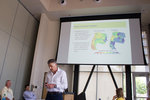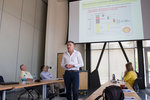

A group of researchers has identified Lewis County as an ideal place for a biorefinery, a facility that would convert poplar trees, or biomass, into fuels and chemicals.
“The economics of producing fuel is challenging to say the least,” said Rick Gustafson, who was invited by Lewis County Economic Development Council to present his research to local business leaders on Tuesday afternoon.
The U.S. Department of Agriculture awarded Gustafson, a chemical engineer with the University of Washington, and his colleagues a $40 million grant to expand what has been a Midwest-centric biofuels industry into Washington, Oregon, Idaho, western Montana and northern California.
The Lewis County Economic Development Council invited Gustafson to discuss what would be a completely new industry in Lewis County. Gustafson, who is the project director, said he doesn’t want to create industry, but lay the foundation for it.
“The Lewis County angle is sort of the last thing we are trying to do,” Gustafson said after his presentation.
Bob Guenther has worked with Gustafson and his team to bring this industry to Lewis County. Guenther is on the board of directors for Lewis County EDC as well as the Centralia Coal Transition Weatherization Board.
The University of Washington and Washington State University each received a $40 million grant from the U.S. Department of Agriculture to research a Pacific Northwest, wood-based biofuels industry.
According to UW, sugar can be extracted from the trees and converted into fuel-grade ethanol, among other chemicals.
“I think what we were trying to make sure of was that the local folks know we have two major universities that have spent $80 million in studies,” Guenther said. “What we wanted to do was to show this was a viable opportunity for industry in Lewis County.”
Guenther noted the presentation was about outlining specifics for the local business community.
“When you have two major universities that have expended those funds from the federal government and have identified Lewis County as a good place for this, why shouldn’t we do everything we can to land something like that in our county,” Guenther said.
According to findings from the research, Lewis County is an ideal place for a biorefinery because it could grow a lot of trees cheaply. The county has infrastructure, a workforce and a potential to co-locate with TransAlta.
Co-locating is beneficial because the new industry could use some of the resources from the old plant, especially steam.
Gustafson and Guenther met with TransAlta about a year ago to gauge its interest. Guenther expects to meet with TransAlta again in the next three or four weeks to discuss co-locating.
“We presented it and there was some interest on (TransAlta’s) part,” Gustafson said. “They are busy running a factory and we haven’t pursued it further, but we would like to….At that time, they were just worried about going over to natural gas and their future. So it was sort of left up in the air.”
Patricia Townsend, who has done outreach in Lewis County, talked to various local stakeholders about growing poplar trees in the county. Townsend is the regional extension specialist and educator for Advanced Hardwood Biofuels Northwest (AHB).
“We presented to them different possibilities for how poplar could be grown in this area,” Townsend said. “We have talked to them about how it could be a traditional agricultural crop that farmers could grow. We have also talked to them about growing it in areas that are flood-prone, not necessarily along the river, but in flood-prone areas to help farmers in growing on lands that are too wet to grow their crops. And then we have talked to people about growing it as part of a wastewater treatment plant.”
The City of Chehalis has such a poplar orchard it uses to soak up treated water from its wastewater treatment process, rather than releasing the water into the Chehalis River.
Gustafson said he believes Lewis County is capable of producing up to 250,000 tons of biomass per year.
Leaf Resources Limited, a company that focuses on making sustainable products from plant biomass, has expressed interest in investing in a Lewis County site.
As far as a timeline, Senior Process Engineer at Leaf Resources Brian O’Neill estimated that it would be at least four years before his company began physical work on a biorefinery in Lewis County. O’Neill said the company is currently working to open a site in Malaysia and actively looking for a second site.
Guenther said there are a couple different ways to build the plant, but that Leaf Resources has some experience in this field.
“The next step would be to feel the temperature of local community leaders and then do more work with the universities to come up with a more defined plan, and actually communicate with TransAlta more,” Guenther said. “Then I think, politically, we have to go to the governor’s office and talk about what the possibilities are.”